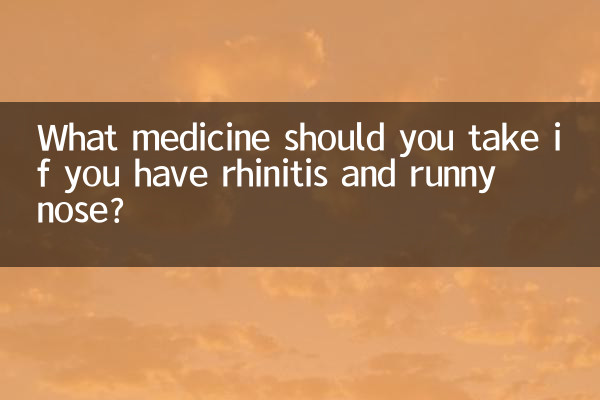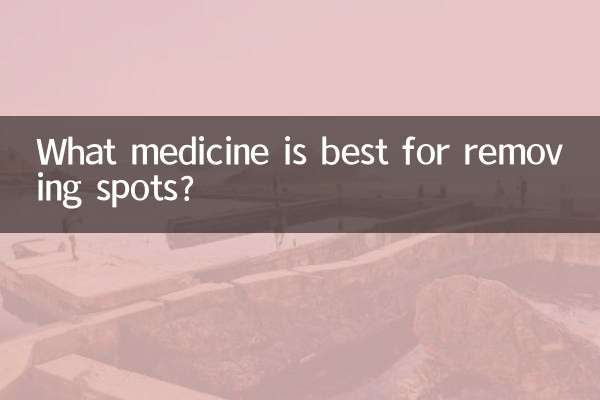What medicine should you take if you have rhinitis and runny nose?
As the seasons change and environmental pollution intensifies, rhinitis has become a common problem that plagues many people. In the past 10 days, discussions on rhinitis treatment and drug selection have continued to rise across the Internet. This article will combine the latest hot topics to provide you with structured data and analysis to help you understand how to choose drugs when you have rhinitis and nasal discharge.
1. Statistics of hot topics related to rhinitis in the past 10 days across the entire network

| Ranking | hot topics | Discussion popularity | main focus |
|---|---|---|---|
| 1 | Seasonal Rhinitis Medication Guide | 85,000+ | Spring Allergen Protection |
| 2 | Rhinitis drug side effects comparison | 62,000+ | drug safety assessment |
| 3 | Traditional Chinese medicine treatment of rhinitis | 58,000+ | Traditional therapy effects |
| 4 | Medication precautions for rhinitis in children | 47,000+ | Special medicine for children |
| 5 | Rhinitis surgery vs drug treatment | 39,000+ | Treatment options |
2. Drug treatment plan for rhinitis and excessive nasal discharge
For the symptoms of increased nasal discharge caused by rhinitis, medical experts recommend the following drug treatment options:
| drug type | Representative medicine | Mechanism of action | Usage suggestions |
|---|---|---|---|
| antihistamines | Loratadine, Cetirizine | Block allergic reactions | Once a day, pre-symptomatic prophylaxis |
| Nasal corticosteroids | Mometasone furoate, budesonide | Reduce inflammatory response | Better results with continuous use |
| Decongestants | Pseudoephedrine, oxymetazoline | constrict nasal blood vessels | Short-term use (≤7 days) |
| anticholinergics | ipratropium bromide | Reduce gland secretion | For severe runny nose |
| Chinese medicine preparations | Biyankang tablets, Xinqin granules | Regulate immune function | Need syndrome differentiation and treatment |
3. Medication characteristics for different types of rhinitis
According to recent clinical research data and Internet discussion hot spots, patients with various types of rhinitis should pay attention to the following differences in drug selection:
| Rhinitis type | Main symptoms | drug of choice | Medication cycle |
|---|---|---|---|
| allergic rhinitis | Paroxysmal sneezing, watery rhinorrhea | Nasal steroids + oral antihistamines | seasonal/long-term |
| nonallergic rhinitis | Persistent nasal congestion and thick nasal discharge | Nasal hormone + saline rinse | 4-8 weeks |
| Vasomotor rhinitis | Temperature changes trigger symptoms | Anticholinergic + Nasal Moisturizer | Symptomatic period |
| drug-induced rhinitis | rebound nasal congestion | Gradually discontinue decongestants | 2-4 weeks transition period |
4. Medication precautions that are hotly discussed on the Internet
According to the analysis of social media data in the past 10 days, the following medication issues have received widespread attention:
1.Drug dependence:About 37% of discussions addressed the risk of dependence on decongestants, with experts recommending no more than seven consecutive days of use.
2.Medication safety for children:25% of parents inquired about the dosage of rhinitis medication for children. Children under 2 years old need to choose antihistamines carefully.
3.Combined medication effects:18% of users shared that the combined use of antihistamines and nasal hormones can increase the efficacy by more than 30%.
4.Traditional Chinese medicine conditioning:15% of patients are concerned about the effect of traditional Chinese medicine in treating chronic rhinitis, but attention should be paid to syndrome differentiation and medication use.
5.Medications during pregnancy:12% of pregnant mothers discuss safe medication options, and budesonide nasal spray is recommended by most experts.
5. Comprehensive treatment plan recommended by experts
Based on recent clinical guidelines and Internet discussion hot spots, the following step-by-step treatment plan is recommended:
1.Mild symptoms:Nasal irrigation with normal saline + oral second-generation antihistamines (such as loratadine) if necessary
2.Moderate symptoms:Nasal glucocorticoid (used in the morning) + leukotriene receptor antagonist (at night) + saline rinse
3.Severe symptoms:When the above treatments are ineffective, decongestants can be added in the short term or immunotherapy can be considered
4.Chronic patients:Traditional Chinese medicine conditioning combined with local treatment of the nasal cavity, regular review and adjustment plan
Special reminder: The data in this article are synthesized from recent online discussion hot spots and medical guidelines. Please follow your doctor's advice for specific medication. If symptoms persist or adverse drug reactions occur, you should seek medical advice promptly to adjust the treatment plan.

check the details

check the details